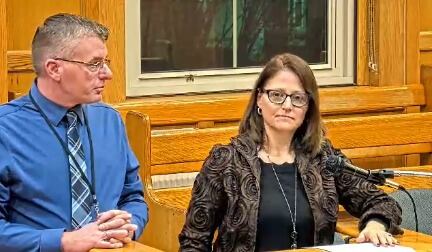Westfield Superintendent Stefan Czaporowski and Director of Assessment Christine Shea at the Dec. 2 School Committee meeting.
Photo credit: Westfield Community TV
WESTFIELD — While the state Legislature is currently pushing for a bell-to-bell cell phone ban in public schools, Westfield High School is planning to launch a pilot program in January that would limit which programs may be accessed in the school while still allowing use of cell phones for educational and emergency purposes.
Last year, the district received a $25,000 grant from the state Department of Elementary and Secondary Education to develop its own cell phone policies. After months of study, the principals of Westfield High School, Westfield Technical Academy and Westfield Middle School came before the School Committee to present their findings.
WMS Principal Jesse McMillan, who had taken the lead on the policy development, said the goal was to create clear guidelines for upper class students and their usage of cell phones; to help them navigate “appropriate developmental cell phone usage” while balancing the benefits of technology in the classroom.
At the same meeting, Superintendent Stefan Czaporowski said Westfield is trying to prepare students for the workforce and higher education, neither of which bans cellphones.
“Even if we have a hard ban, it is not 100% effective,” Czaporowski told the School Committee. “This isn’t an issue that we want to get kids out of school for. How about we try to teach some responsibility. It’s worth a shot.”
Ultimately, the decision was made that cell phone usage at WMS would not be allowed through grade 8. McMillan said the ban is working well at WMS.
“We have a firm no cell phone policy. It is working extremely well. The teachers notice a considerable difference in our building without them. Overall, students have responded well and follow the policy,” he said.
Teachers at WTA and WHS do allow restricted usage for activities that include specific educational apps such as Quizlet and Kahoot, calculators, notes for presentations and educational resources such as Khan Academy.
“WTA allows teachers to create and enforce their own policy for cell phones. Most of our shops do not allow access except during shop break or lunch. If a student continuously breaks teacher rules, we have purchased cases where we can lock up the phone safely during the school day,” said Principal Bruce Hastings about the program implementation at Westfield Technical Academy.
Next winter, Westfield High School will participate in a pilot program that goes one step further. Christine Shea, director of assessment and accountability for the district, said the program, called Analog, is by a new company that provides 6-inch tall beacons that go in each classroom.
“What that allows to happen, even at the administrative level, is that students can use the phone to make a phone call with permission; a teacher can give access for Quizlet, translation apps and other content-specific apps and nothing else. It’s something we’re able to change at the classroom or school level — a teacher can lock and give access to something different,” Shea said.
Shea said the program, which will roll out in January after staff have received training on it, would be downloaded on the student’s phone after receiving a permission slip from the family. “If the parents say no, the students won’t be allowed to have a cellphone at school. We think parents will allow it, because it gives them access to the student in case of emergency, but it will lock social media,” she said.
Analog locks the programs wherever the administration wants it locked, in the hallway, lunch room, gymnasium — WHS is trying to figure out where kids can have access to their phones, Shea said.
Czaporowski said the company approached him back in February, and proposed a free pilot for Westfield as an incentive to try the technology out. He thinks they may have contacted him due to some of the news stories about the discussion in the Westfield School Committee around responsible cell phone usage.
“To me, one of the best ways to eliminate cell phone use is to have engaging instruction. If the students are busy learning, usually that’s hands-on, they don’t have time to use their phones,” Czaporowski said, adding that in some shops in WTA, students use phones as a tool, such as looking up a recipe on their phone rather than printing it out.
“The bottom line is this, I don’t want to get in the habit of taking kids’ phones on a regular basis. Something could happen, and we may be liable. The other issue is the time spent on discipline — I don’t know how productive it will be. If we’re preparing our high school students for the real world, we really should focus on appropriate use rather than banning them completely,” Czaporowski said.
“Three-quarters of the kids every year out on co-op tells us something is working. If the kids were on their phones every day at work, they wouldn’t have a job,” he added.
Czaporowski said he’s glad the company reached out to him. “Hopefully Analog works; it gives the teachers some control. If they don’t want it, administrators can use it. It seems like a reasonable approach to a problem. If it works, we’ll use it. I think it’s going to be a good thing.”
He said the program will be vetted by the technology department before the roll out.
As for the state ban, Czaporowski is not in support. “I believe it’s a legislative overreach and I’m disappointed that they’re doing this,” he said.
Shea said what the Analog program purportedly does is take the interaction between the teacher and the student away once it’s in place.
“That will cut down on so much negative interaction as soon as the student walks into the classroom. I feel this is going to be a really positive way [forward.] What we’d like to do is to help juniors and seniors as they go into the world to learn etiquette for cell phones. If you take them away, you’re not learning anything. There are also positive uses in schools.
“We’re really hoping that this will work. If it does work, we’ll go to DESE and say this is a positive solution,” Shea added. “My hope is if the state requires very stringent guidelines, that they do provide funding to implement them. Whether you’re buying these beacons or Yondr bags, how can the state have a mandate that’s not funded?”
More information about the Analog program may be found at Smart Spaces for Healthier Digital Habits at goanalog.co.


